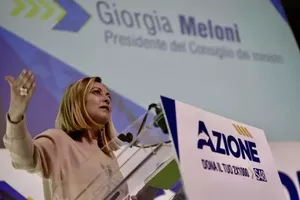“The extraordinary tax may make attracting new equity capital and wholesale funding more costly for banks, as domestic and foreign investors may have less appetite to invest in Italian credit institutions that have a more uncertain outlook,” the ECB said in an opinion on the 40 per cent tax on Italian banks’ surplus profits.
“Moreover, the introduction of an ad hoc retroactive tax unduly increases policy uncertainty regarding the tax framework, damaging investor confidence and potentially also affecting the cost of funding for non-financial corporations.
“In addition, its retroactive nature may fuel perceptions of an uncertain taxation framework and give rise to extensive litigation, creating problems of legal uncertainty.”
The ECB also said that it “recommended that a clear separation is necessary between the extraordinary nature of the proceeds and the general budgetary resources of a government to avoid their use for general fiscal consolidation purposes”.
Prime Minister Giorgia Meloni has repeatedly defended the windfall tax as a “just” measure.
The government intends to use the revenue generated from the tax to finance a fund for mortgages on first homes and for interventions to reduce the tax burdens of households and businesses.
ANSA



























